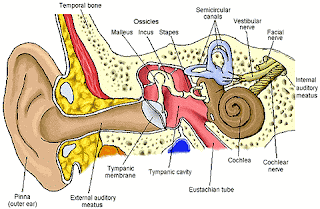Many people, especially as they age, become bothered by an odd noise that only they can hear. It may sound like a ringing, buzzing, humming or hissing. Hearing a noise that is not there, that only you can hear, can be unsettling, and until you figure out what it is, you might even think you're going a bit wacko, as you ask your partner, "What's that noise?" And they look at you strangely and say, "What noise? I don't hear anything." I write from personal experience with this condition, known as Pulsating Tinnitus.
Medically, it is not dangerous, merely annoying. It can sometimes be a symptom of some other underlying problem, but that is less common. Approximately one in five people experience Pulsating Tinnitus at some point in their lives. It can be temporary or permanent.
What Causes Pulsating Tinnitus?
As you may recall from your high school biology or physiology classes, the ear is made up of three parts:
- The outer ear, or ear canal, ending at the eardrum
- The middle ear, containing the bones that transmit the sound waves from the eardrum
- The inner ear, a fluid-filled space containing tiny hairs that vibrate and send the message along the otic nerve to the brain, producing the sounds we all hear
When the tiny hairs within the inner ear become bent, broken or otherwise damaged, usually by repeated exposure to loud noise with no ear protection, it is as if they are permanently sending a signal of that frequency to the brain. Hence, it is truly "all in your head," and explains why no one else can hear "that funny noise."
Sometimes the cause is physical damage to the ear from an injury; sometimes it can be a symptom of something else, such as a blood pressure issue. There can be other causes, ranging from types of tumors in the area to stress.
What Can Be Done To Cure Pulsating Tinnitus
Unfortunately, there is no real cure. There is not a lot that can be done to reverse the condition unless it has been determined that the cause is physical. Therefore, when you first notice you are having this problem, it is best to see your doctor and have it checked out.
If the doctor finds you have high blood pressure, he or she can put you on appropriate medication, or lifestyle modification to treat that underlying problem. There can be other, more serious causes, but they occur much more rarely. Still, this is why you see the doctor--to rule out these possibilities.
What Does Pulsating Tinnitus Sound Like?
Personally, I experience it as a low, two-toned, (diatonic), humming, almost like a distant electric motor first pulling its start-up load, then settling into its regular running pitch. However, it is a constant re-starting, as if someone were fooling with the current to the motor, causing it to continually stop, re-start, run a few seconds, stop and re-start again--except that the "stop" pause is missing. Pulsating Tinnitus is just a continual diatonic humming.
How Do You Manage Pulsating Tinnitus?
Most of the time during the day, it does not bother me--there is enough other background noise to mask the inner disturbance. You know, the old, "I can't hear you when the water's running!" effect.
However, at night, trying to get to sleep when the world has gone quiet, it's quite another matter. It's as if the volume has been turned up, and it does cause me trouble trying to settle down and fall asleep.
For each person, the choice of how to deal with this annoying malfunction of the body will differ, as the way the condition manifests will also differ from person to person.
So, I have a clock-radio that has a white noise generator function. I can set if for any of several nature sounds, such as ocean surf; rainstorm, running brook, etc., that are peaceful, relaxing sounds. I do not hear the pulsating tinnitus above these more pleasant sounds, so I can fall asleep in peace.
That is my solution. It's basically free. If you have a worse issue with the volume, and it bothers you during the day, your doctor may be able to offer other options.
But don't go for anything drastic. People have been known to go through horrible operations, deliberately rendering themselves deaf, all to no avail, because the sound is not arriving via your ear canal and hitting your eardrum--'all in your head'--remember? For the same reason, trying to block the sound by hiding under a pillow is also ineffective.
A Frustrating Conclusion
In the end, this is one of those unhappy endings where after all the explanations, the final conclusion is that there is really not much that can be done about the matter.
It's a "learn to live with it" scenario. I hope at least to have provided some useful insight into the why's and wherefore's of this aggravating condition, and offered some recourse for dealing with it so that it is not interfering with living your life.
For more information on how to cure pulsating tinnitus, please visit my website here.

No comments:
Post a Comment